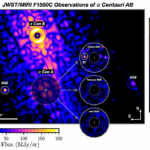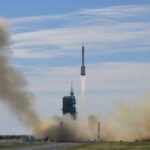On Jan. 11, 2026, I watched anxiously at the tightly controlled Vandenberg Space Force Base in California as an awe-inspiring SpaceX Falcon 9 rocket carried NASA’s new exoplanet telescope, Pandora,
phys.org9- Page
The X-Ray Imaging and Spectroscopy Mission (XRISM), a joint mission between the Japanese Aerospace Exploration Agency (JAXA) and NASA, launched on Sept. 7th, 2023. Its advanced imaging filters and spectrometers
Pandora, the latest in a long portfolio of University of Arizona’s space science missions, has cleared its last major milestone on its journey into space. This week, Pandora—a satellite about
NASA crewmembers aboard the International Space Station (ISS) could return to Earth as soon as Thursday, the US space agency said, after a medical emergency prompted the crew to return
A small group of young researchers at the Cosmic Dawn Center, Niels Bohr Institute, University of Copenhagen, have, through observations of the early stages of an extremely large galaxy cluster’s
Astronomers have completed the most comprehensive census of active galactic nuclei (AGN) to date, providing the clearest picture yet of the probability that galaxies of different sizes host active black
Astronomers have long puzzled over how some massive galaxies stop forming stars and remain dormant for billions of years—even when they still contain gas that could, in principle, fuel new
SpaceX has the first of a series of afternoon launches in the next week on tap Friday with another Starlink mission from Cape Canaveral.
Humans have always been fascinated with space. We frequently question whether we are alone in the universe. If not, what does intelligent life look like? And how would aliens communicate?
In a rare move, NASA is cutting a mission aboard the International Space Station short after an astronaut had a medical issue.
-
 01Two Black Holes Observed Circling Each Other for the First Time
01Two Black Holes Observed Circling Each Other for the First Time -
 02From Polymerization-Enabled Folding and Assembly to Chemical Evolution: Key Processes for Emergence of Functional Polymers in the Origin of Life
02From Polymerization-Enabled Folding and Assembly to Chemical Evolution: Key Processes for Emergence of Functional Polymers in the Origin of Life -
 03Φsat-2 begins science phase for AI Earth images
03Φsat-2 begins science phase for AI Earth images -
 04Thermodynamic Constraints On The Citric Acid Cycle And Related Reactions In Ocean World Interiors
04Thermodynamic Constraints On The Citric Acid Cycle And Related Reactions In Ocean World Interiors -
 05Hurricane forecasters are losing 3 key satellites ahead of peak storm season − a meteorologist explains why it matters
05Hurricane forecasters are losing 3 key satellites ahead of peak storm season − a meteorologist explains why it matters -
 06Binary star systems are complex astronomical objects − a new AI approach could pin down their properties quickly
06Binary star systems are complex astronomical objects − a new AI approach could pin down their properties quickly -
 07Worlds Next Door: A Candidate Giant Planet Imaged in the Habitable Zone of α Cen A. I. Observations, Orbital and Physical Properties, and Exozodi Upper Limits
07Worlds Next Door: A Candidate Giant Planet Imaged in the Habitable Zone of α Cen A. I. Observations, Orbital and Physical Properties, and Exozodi Upper Limits


